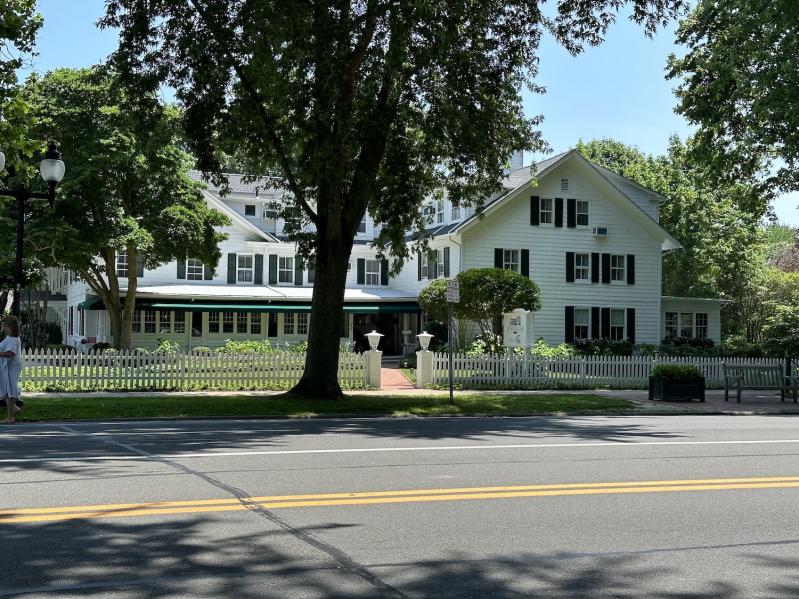A neighbor of the Huntting Inn, which is seeking to add a swimming pool to its Main Street property, appeared before the Zoning Board of Appeals on Friday to voice some concerns.
“If the application is granted, I imagine the Maidstone Inn, Hedges Inn, Mill House Inn, and perhaps some B&Bs, will ask for [a pool], and the fresh precedent will be difficult to overcome,” Frank Morgan told the board. “One further point. I find it disingenuous to put the swimming pool in an A.D.A. wrapper. The prime purpose of this pool is not to allow physically challenged individuals to take a dip.”
“We love the ocean, everyone loves the ocean, but once you have a mobility impairment, getting to the beach and especially the ocean water is not always feasible,” said Martha Reichert, a lawyer speaking for Landry’s Inc., owner of the inn since 2020. “You want to do some aqua aerobics, the ocean beach isn’t necessarily the safest place to do it, and not everyone loves the ocean.”
The inn, built in 1699, needs several variances before it can proceed. It is located in a residential area, surrounded by families, 10 of which showed up at the uncharacteristically crowded hearing to indicate their resistance to the application.
A plan to update the property was presented months after its $45 million purchase. Landry’s, which owns multiple other hotels and casinos, including the Golden Nugget in Las Vegas, presented plans for a pool, cabanas, a hot tub, and many upgrades which, the Z.B.A. was told, would help the inn comply with the Americans With Disabilities Act.
That application was ultimately withdrawn, in June 2021, after a similar outcry from neighbors.
In October 2022, Landry’s submitted a pared-down application, with fewer cabanas and no hot tub.
At Friday’s meeting, Ms. Reichert put A.D.A. compliance front and center in her presentation. “There are currently no entrances to that building that don’t have stairs,” she said. “It is the desire of the new owners to bring this property into A.D.A. compliance, and they are in fact mandated, there is no exception for historic structures.”
While a pool is still sought, the cabanas and hot tub are no longer part of the plan. Two new handicapped parking spots would be next to an A.D.A. pathway leading to a ramp. The building’s first floor would now have a handicapped-compliant bathroom and elevator. A second-floor suite is planned as a “fully compliant mobility room, meaning that someone in a wheelchair can be rolled into the shower,” Ms. Reichert said. Two bar seats would be A.D.A.-compliant as
well, she noted, though that is outside the purview of the Z.B.A.
The existing rooms would be reconfigured, she said. No new rooms, and no change to occupancy, are proposed. Ms. Reichert argued that this proved the inn, which was built many decades before zoning, was not expanding its nonconforming use. As part of that use, she continued, the “roll-in” swimming pool was “a customary accessory,” which would be surrounded by a “pervious patio,” chosen specifically for its A.D.A. compliance.
“Just to be clear, you can make the property A.D.A.-compliant without adding the pool, correct?” asked Philip O’Connell, a board member. His question drew chuckles from the crowd.
“Yes, we can absolutely make the property A.D.A.-compliant, but the desire to have an accessory structure [the pool] that we would be entitled to — we would like to be able to offer that amenity, but also we feel it comes part and parcel with providing A.D.A. amenities to our clients.”
“The Baker House has a pool,” she added. “I don’t believe it’s been an issue for the neighborhood.” (The Baker House pool, installed in 2005, did not require a variance.)
Joe Rose, a zoning board member, noted the improved application, but focused on how the pool would be used. “Is this anticipated as an amenity for hotel guests, or is this an entertainment space?” he asked.
“It’s just for guests,” answered Ms. Reichert. “In some ways, we’re reducing areas where guests could congregate, if it was just lawn.” The pool would only be open seasonally, it would be closed in the evenings, and it would have a retractable cover, ensuring that no late-night drunken pool jumpers would invade.
“It’s not available for lease or rental for an event — for a pool party?” asked Mr. Rose.
“We can covenant that it will only be used for guests of the inn,” Ms. Reichert answered.
Joseph Fell was the lone resident to speak in support of the pool, although, as a neighbor pointed out, he lives a half-mile from the inn, down David’s Lane.
“The mayor supports these businesses, and it’s advantageous for them to have their pool,” he said. “It’s a tiny pool.”
“You live on Main Street,” he said, addressing Mr. Morgan and the other neighbors. “You have traffic 24/7, it’s not some kind of silent monastery. The only reason I’m here is because I like going to The Palm, and I will put guests up at the Huntting Inn.”
Lisa Pugliese-Dortch, a neighbor, argued that a pool was not in keeping with the site’s history. The inn, she said, is in two overlapping historic districts. “The addition of a swimming pool is an amenity, not a right,” she said. “Presenting this as an application that is primarily about being A.D.A. compliant is a false narrative.”
The board voted to keep the hearing open until its next meeting, on Aug. 11.




